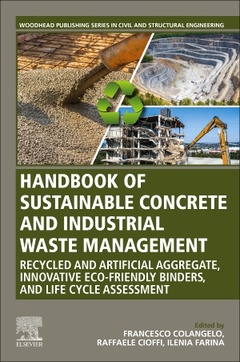Handbook of Sustainable Concrete and Industrial Waste Management Recycled and Artificial Aggregate, Innovative Eco-friendly Binders, and Life Cycle Assessment Woodhead Publishing Series in Civil and Structural Engineering Series
Coordonnateurs : Colangelo Francesco, Cioffi Raffaele, Farina Ilenia

The Handbook of Sustainable Concrete and Industrial Waste Management summarizes key research trends in recycling and reusing concrete and industrial waste to reduce their environmental impact. This volume also includes important contributions in collaboration with the CRI-TEST Innovation Lab, Naples ? Acerra.
Part one discusses eco-friendly innovative cement and concrete and reviews key substitute materials. Part two analyzes the use of industrial waste as aggregates and the mechanical properties of concrete containing waste materials. Part three discusses differences between innovative binders, focusing on alkali-activated and geopolymer concrete. Part four provides a thorough overview of the life cycle assessment (LCA) of concrete containing industrial wastes and the impacts related to the logistics of wastes, the production of the concrete, and the management of industrial wastes.
By providing research examples, case studies, and practical strategies, this book is a state-of-the-art reference for researchers working in construction materials, civil or structural engineering, and engineers working in the industry.
Part 1. Eco-friendly innovative cement and concrete 1. Foamed concrete containing industrial wastes 2. Valorization of industrial by-products and wastes as sustainable construction materials 3. Enunciation of lightweight and self-compacting concretes using non-conventional materials 4. The use of construction and demolition waste as a recycled aggregate in sustainable concrete production: workability, strength, and durability properties 5. Natural fibers 6. Eco-friendly fiber-reinforced concretes
Part 2. Use of industrial waste as aggregates: properties of concrete 7. Energy-saving materials 8. Fresh and mechanical properties of concrete made with recycled plastic aggregates 9. Recycled glass as a concrete component: possibilities and challenges 10. Recycled aggregate concrete: mechanical and durability performance 11. Microstructure and properties of concrete with ceramic wastes 12. Agricultural plastic waste 13. Recycling and applications of steel slag aggregates 14. Quarry waste 15. Implementation of agricultural crop wastes toward green construction materials 16. Balancing sustainability, workability, and hardened behavior in the mix design of self-compacting concrete 17. Design guidelines for structural and non-structural applications 18. Strength and microstructure properties of self-compacting concrete using mineral admixtures. Case study I 19. Durability properties of self-compacting concrete using mineral admixtures. Case study II
Part 3. Innovative binders: alkali-activated and geopolymer concrete 20. Difference between geopolymers and alkali-activated materials 21. Geopolymer binders containing construction and demolition waste 22. On the properties of sustainable concrete containing mineral admixtures 23. Sustainable alkali-activated materials 24. Design guidelines for structural and non-structural applications 25. Future trends: nanomaterials in alkali-activated composites
Part 4. Life cycle assessment (LCA) of concrete 26. Calculation of the environmental impact of the integration of industrial waste in concrete using LCA 27. Role of transport distance on the environmental impact of the construction and demolition waste (CDW) recycling process 28. Management of industrial waste 29. Use of industrial waste in construction and a cost analysis 30. Life cycle assessment (LCA) of concrete containing waste materials: comparative studies 31. Opportunities and future challenges of geopolymer mortars for sustainable development
Raffaele Cioffi?has a degree in Chemical Engineering from the University of Naples Federico II. He is Professor of Materials Science and Technology and Materials Engineering at the University of Naples “Parthenope, Naples, Italy. He has been the Head of the Department of Technology and the?director of the Research Quality Centre of the University of Naples "Parthenope". He has been the director of the Sustainable Development Engineering Laboratory of the Department of Technology, the president of the Teaching Board for?the?Industrial Engineering Course, and he is the coordinator of the Technical and Scientific Committee for the Master Course in Safety Engineering of the University of Naples " Parthenope". He is the vice-president of the Italian Association on Materials Engineering (AIMAT).
Ilenia Farina?received a?master's degree in Civil Engineering?from the University of Naples “Parthenope and a postgraduate certificate in Materials Science and Engineering from the University of Sheffield (UK); the title of her dissertation was “Plasma treatments of polymers for increased adhesion in composite materials. In 2012, she graduated in Civil and Environmental Engineering at the University of Salerno, submitting a final project titled “Mechanical properties and manufacturing process of innovative sustainable cementitious materials. Her research interests cover the development of innovative materials for sustainable construction. She has conducted?experiments?to demonstrate the?use?of plastic?fibers?obtained from waste plastic as dispersed reinforcement in cementitious materials. Furthermor
- Offers a systematic and comprehensive source of information on the latest developments in sustainable concrete;
- Analyzes different types of sustainable concrete and innovative binders from chemical, physical, and mechanical points of view;
- Includes real case studies showing application of the LCA methodology.
Date de parution : 12-2021
Ouvrage de 728 p.
15.2x22.8 cm



